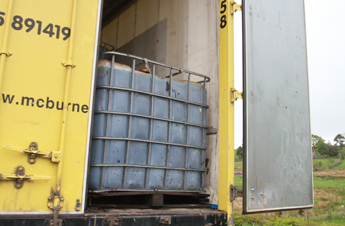Following the discovery of 40,000 litres of fuel sludge at Drumad, County Louth, the Sinn Féin Louth TD Gerry Adams has condemned the criminal gangs involved in the cross-border fuel laundering scam and has said that “The only effective means of closing down this illegal activity is to end the differential between agricultural and non-agricultural diesel. The government needs to introduce in its place a system where farmers can reclaim a rebate on their fuel costs based on vouched expenditure”.
[caption id="attachment_39255" align="alignleft" width="345"] A trailer load of laundered fuel waste waste was also abandoned near Castlewellan in May 2013.[/caption]
A trailer load of laundered fuel waste waste was also abandoned near Castlewellan in May 2013.[/caption]
In the past fuel sludge has been dumped at various locations in County Down by the fuel laundrerers.
The Sinn Féin leader has also accused some Louth politicians of making irresponsible claims that drinking water has been polluted. He said: “This assertion, especially given the assurances by the Director of Services in Louth County Council that the drinking water is safe, can only serve to undermine the efforts of the Council to promote tourism and business in Dundalk and its hinterland and to undermine public confidence.”
The Louth TD accused the gangs involved in diesel laundering of “causing serious environmental and health problems, putting at risk legitimate business and jobs, as well as imposing significant financial costs on local councils and the tax payer. Over five million euro has been spent on cleaning up fuel laundering sites, most of it in County Louth.”
The Sinn Féin Louth TD has revealed that he has also written to the Manager of Louth County Council, to the Environmental Protection Agency and to An Garda Síochána following reports in the Sunday Independent on January 18 that ‘cancer-causing toxins’ being dumped into the River Fane. In its report the Sunday Independent claimed to have ‘obtained evidence of carcinogenic waste flowing from an illegal fuel plant in South Armagh into Lough Muckno, Lough Ross and the Fane River – which is the main reservoir for the whole of Dundalk.’
Adams added: “All of this clearly raises serious concerns for residents who live along the river, use it for leisure purposes, including fishing, and for the thousands who may be drinking water from these sources every day. Last year the world fly-fishing competition was held on the River Fane.
“I am asking all of the relevant agencies with responsibility for monitoring our water resource to carry out a thorough, detailed, environmental investigation of the claims made, including taking samples of water from the allegedly polluted water sources.
I am also asking An Garda Siochána to seek all relevant information from the Sunday Independent, including the fuel laundering site that it claims to have knowledge of.
“I note the assurance from Louth County Council’s Director of Services that tests on the water found ‘no issue’ and that ‘the water supply to Dundalk is safe.’ Despite this other politicians have in a very irresponsible way continued to claim that drinking water has been polluted. This assertion – especially given the Director of Services assurances – can only serve to undermine the efforts of the Council to promote tourism and business in Dundalk and its hinterland and to undermine public confidence.
“They also assert that republicans are involved in this fuel laundering and dumping of toxic waste. Let me be very clear, those involved in this practice are criminals and must be made subject to the full rigours of the law. I and other Sinn Féin representatives in Louth and South Armagh have consistently spoken out against this criminality and raised it in our conversations with the PSNI and An Garda Siochána.
“If the claims of pollution are accurate they represent a serious economic and human threat to the people of south Armagh and north Louth.
“All of this must be of great concern to residents, local businesses, schools, Louth County Hospital, as well as to hoteliers, restaurants and others who use tap water every day.”
]]>






















